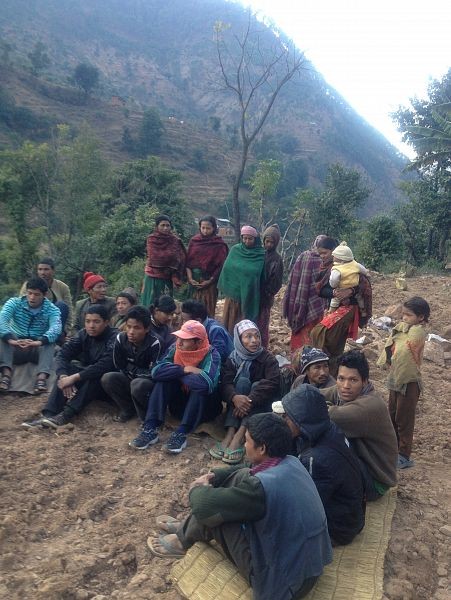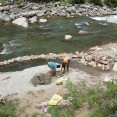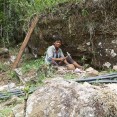This project aims to pilot a water lifting technology for irrigation and an associated off-season vegetable farming enterprise
 This project aimed to demonstrate the potential that underused micro-hydropower systems have for creating income generation opportunities. It did so by investing in water pumping and irrigation infrastructure at an existing 32kW micro-hydropower (MHP) system which was operating at less than 30% of its capacity and running into significant debt. The surplus energy produced by the system was used to pump water up to a height of 300m and the water was used to irrigate vegetable plots via drip irrigation. The development of this infrastructure went hand-in-hand with the provision of support to the community in terms of vegetable growing and business skills, as well as linking with sources of finance and market demand.
The Simalchour village and surrounding area in the mountainous region of Western Baglung is composed of around one hundred households and has a population of around 580. Prior to the implementation of the project, the population depended mainly on manual labour, fishing and selling fuelwood. No significant vegetable farming took place in the community before this project. Additionally, it is common for young people to choose to move away from the area due to the lack of income-generating opportunities.
This project aimed to demonstrate the potential that underused micro-hydropower systems have for creating income generation opportunities. It did so by investing in water pumping and irrigation infrastructure at an existing 32kW micro-hydropower (MHP) system which was operating at less than 30% of its capacity and running into significant debt. The surplus energy produced by the system was used to pump water up to a height of 300m and the water was used to irrigate vegetable plots via drip irrigation. The development of this infrastructure went hand-in-hand with the provision of support to the community in terms of vegetable growing and business skills, as well as linking with sources of finance and market demand.
The Simalchour village and surrounding area in the mountainous region of Western Baglung is composed of around one hundred households and has a population of around 580. Prior to the implementation of the project, the population depended mainly on manual labour, fishing and selling fuelwood. No significant vegetable farming took place in the community before this project. Additionally, it is common for young people to choose to move away from the area due to the lack of income-generating opportunities.
Technology, Operations & Maintenance
The project, jointly implemented by Management Innovation and Technology Solutions and Dhaulagiri Community Resource Development Centre, was carried out in three phases. The first phase comprised the baseline survey, setting up the cooperative and its various committees (e.g. the pump operation and maintenance committee, and the vegetable business committee) and basic capacity-building activities for cooperative operation and vegetable nursery development at household level. The second phase involved the procurement and construction of the infrastructure, including excavation, building the pumps, pump house, main storage tank and distribution ponds, main conveyance system and distribution pipes etc. The project constitutes the first multistage centrifugal pump used for such height and flow in Nepal. The community provided significant cash and in-kind contributions to this phase (up to 25%). This second phase included a focus on access to finance and markets for interested local farmers. The coordinators negotiated a set of loans with a local credit facility and fourteen farmers used the finance to build greenhouse tunnels and drip irrigation systems on their land. Moreover, the project rolled out capacity- building activities for a range of skills from pump operation and maintenance to market development (e.g. pricing strategies, input supply chain and packaging etc.), book-keeping and off-season vegetable farming. For the latter, the district’s Agriculture Development Office complemented the project’s efforts by providing 90 days of training on vegetable farming to one farmer, who went on to become a trainer for other farmers in the community. The third phase focused on monitoring progress and ensuring the long-term sustainability of the project. Specific initiatives in this phase included support for the purchase of an accounting software solution and contribution to the creation of a community vegetable nursery. The monitoring visits found no major technical issues and revealed the development of solid management and decision-making skills within the cooperative.Delivery Model & Financial Management
 The delivery model of this project includes a variety of finely tuned governance and financial elements. The model is, however, centred around a simple monthly fee paid to the managing cooperative by every household that benefits from the irrigation system.
The change in the electricity consumption pattern of the MHP due to the installation of the pump was significant: the daily consumption and plant load factor both increased by 41%, peak demand increased to 20 kW and consumer load factor increased to 60%. Revenue increased accordingly, and the MHP is now expected to pay back its debt after three to four years of operation and run in profit thereafter.
A survey carried out during the monitoring phase revealed that access to a reliable water source has transformed the community, with vegetable farming now an alternative income-generating opportunity for many households. The survey and focus groups revealed that 45 to 50 farmers had started vegetable farming on around 50 to 60 Ropani of land (2.5 - 3 hectares) by June 2015, with the number set to grow as the department of irrigation decided to support a second phase of the project. Three categories of farmer have been identified in the villages, namely large/commercial producers, small producers and subsistence farmers. At the time of the last survey, six large producers were farming half of the land area currently being irrigated and these farmers had produced six tonnes of vegetables in six months.
The delivery model of this project includes a variety of finely tuned governance and financial elements. The model is, however, centred around a simple monthly fee paid to the managing cooperative by every household that benefits from the irrigation system.
The change in the electricity consumption pattern of the MHP due to the installation of the pump was significant: the daily consumption and plant load factor both increased by 41%, peak demand increased to 20 kW and consumer load factor increased to 60%. Revenue increased accordingly, and the MHP is now expected to pay back its debt after three to four years of operation and run in profit thereafter.
A survey carried out during the monitoring phase revealed that access to a reliable water source has transformed the community, with vegetable farming now an alternative income-generating opportunity for many households. The survey and focus groups revealed that 45 to 50 farmers had started vegetable farming on around 50 to 60 Ropani of land (2.5 - 3 hectares) by June 2015, with the number set to grow as the department of irrigation decided to support a second phase of the project. Three categories of farmer have been identified in the villages, namely large/commercial producers, small producers and subsistence farmers. At the time of the last survey, six large producers were farming half of the land area currently being irrigated and these farmers had produced six tonnes of vegetables in six months.
Environmental Issues
The capacity-building for vegetable farming focused on low chemical/pesticide methods, which have been adopted and are resulting in health benefits for the farmers and neighbouring communities. No assessment has been made of the impact of the irrigation system on the water basin.Social Issues
 The project monitoring observed the significant empowerment of women through increased income and participation in vegetable farming and sales, with impacts evident for the Kumal and for other minority groups residing in the Simlachaur and Burtibang areas. The reluctance of the community to include these usually marginalised groups in the decision-making process initially posed a challenge; however, these obstacles were overcome during the course of the project.
The project monitoring observed the significant empowerment of women through increased income and participation in vegetable farming and sales, with impacts evident for the Kumal and for other minority groups residing in the Simlachaur and Burtibang areas. The reluctance of the community to include these usually marginalised groups in the decision-making process initially posed a challenge; however, these obstacles were overcome during the course of the project.
Results & Impact
Exhaustive follow up surveys reveal that the project’s impact is visible in every aspect of the community’s livelihood. Farmers – in particular women - are selling their produce at Burtibang market, resulting in net average earnings of around €50 per month per household. These earnings are used to fund their children’s education. There is also a net increase in economic activity in the communities.Replicability
Nepal has several hundred MHP systems, which mainly supply electricity for lighting in rural communities. The Baglung District of Nepal has around 90 micro-hydro plants, with a total installed capacity of 2500 kW. MIT Solutions estimates that the utilisation factor of these MHP plants is quite low, at around only 40%. With adequate support, the electricity that is currently being wasted could be used on a large scale to create income and offer job opportunities. Specifically, if used for irrigation, this surplus power could lift 12,734 m3 of water per day to a height of 150 metres, irrigating 600 hectares of land. Large-scale implementation in Nepal would require close cooperation between government authorities in irrigation, industry and commerce and relevant local stakeholders, along with concrete government policy on financial and technical support to communities interested in lift irrigation. Moreover, such a programme should focus on developing a human resource base in the country.Lessons learned
Underused renewables-based electricity generation systems offer an immense opportunity for income generation and improving livelihoods. However, pursuing this win-win relationship is not without its difficulties. Some of the technical issues faced during this project included geological challenges due to the very rocky bed, lack of local skills and heavy rainfall. On the management side, there was resistance to the formation of the cooperative and disputes about certain elements such as the storage ponds. Nonetheless, the community in general demonstrated tremendous commitment and drive, which was key to the project’s success.Projects with same technology
Exchange: Micro Hydro for Myanmar: Practice-to-Policy Dialogue with Indonesia, Nepal, and Sri Lanka
To facilitate dialogue between decision-makers in Myanmar and their counterparts in countries that have successfully implemented micro-hydro
Community-based Water Resource Utilisation for Hydropower Generation
To develop a community-based pico-hydro power system as an alternative source of energy
Projects in same country
Promoting the Long-Term Use of Micro-Hydro Systems by Providing Energy to Rural Enterprises in Nepal and India
This projects aim was to ensure the sustained operation of existing micro-hydro plants through rehabilitation, optimisation, increased financial stability, capacity-building and management support